Readings Newsletter
Become a Readings Member to make your shopping experience even easier.
Sign in or sign up for free!
You’re not far away from qualifying for FREE standard shipping within Australia
You’ve qualified for FREE standard shipping within Australia
The cart is loading…






This title is printed to order. This book may have been self-published. If so, we cannot guarantee the quality of the content. In the main most books will have gone through the editing process however some may not. We therefore suggest that you be aware of this before ordering this book. If in doubt check either the author or publisher’s details as we are unable to accept any returns unless they are faulty. Please contact us if you have any questions.
This book demonstrates what the discipline of economics has to offer as support for analyzing cooperation on management of trans-boundary water resources. It also considers what the discipline of economics has to acquire to become a more effective contributor to trans-boundary water resource management given political, legal, social, physical, scientific, and ecological realities. This book has its genesis in a symposium of the International Water and Resource Economics Consortium held at Annapolis, Maryland, April 13-16, 1997. The symposium was organized by the editors and the book contains papers presented at the symposium with subsequent revisions. The symposium brought together both economists and agency management personnel for the purpose of discussing not only how economic tools apply to trans-boundary water management, but also of identifying the obstacles to making such tools useful and informative to politicians and negotiators in public decision making roles. INTERNATIONAL VERSUS DOMESTIC TRANS-BOUNDARY PROBLEMS Trans-boundary water problems arise in many dimensions. The two most important types of problems emphasized in this book are international and domestic interstate or interregional problems. Cooperation on international problems is especially difficult because enforcement must be voluntary given the sovereignty of nations and the absence of an effective legal enforcement mechanism. Agreements must be sustainable and self-enforced if they are to have lasting benefits. Every negotiating country must be convinced it will receive benefits before it gives its consent to cooperation. In the absence of enforceable agreements, trans-boundary (i. e.
$9.00 standard shipping within Australia
FREE standard shipping within Australia for orders over $100.00
Express & International shipping calculated at checkout
This title is printed to order. This book may have been self-published. If so, we cannot guarantee the quality of the content. In the main most books will have gone through the editing process however some may not. We therefore suggest that you be aware of this before ordering this book. If in doubt check either the author or publisher’s details as we are unable to accept any returns unless they are faulty. Please contact us if you have any questions.
This book demonstrates what the discipline of economics has to offer as support for analyzing cooperation on management of trans-boundary water resources. It also considers what the discipline of economics has to acquire to become a more effective contributor to trans-boundary water resource management given political, legal, social, physical, scientific, and ecological realities. This book has its genesis in a symposium of the International Water and Resource Economics Consortium held at Annapolis, Maryland, April 13-16, 1997. The symposium was organized by the editors and the book contains papers presented at the symposium with subsequent revisions. The symposium brought together both economists and agency management personnel for the purpose of discussing not only how economic tools apply to trans-boundary water management, but also of identifying the obstacles to making such tools useful and informative to politicians and negotiators in public decision making roles. INTERNATIONAL VERSUS DOMESTIC TRANS-BOUNDARY PROBLEMS Trans-boundary water problems arise in many dimensions. The two most important types of problems emphasized in this book are international and domestic interstate or interregional problems. Cooperation on international problems is especially difficult because enforcement must be voluntary given the sovereignty of nations and the absence of an effective legal enforcement mechanism. Agreements must be sustainable and self-enforced if they are to have lasting benefits. Every negotiating country must be convinced it will receive benefits before it gives its consent to cooperation. In the absence of enforceable agreements, trans-boundary (i. e.